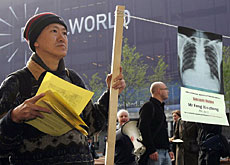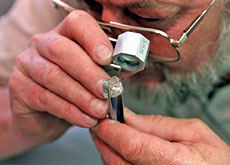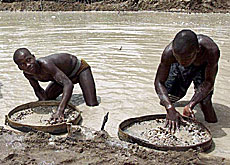Diamonds “no longer a rebel’s best friend”

The European Union has praised recent progress to end the trade in blood diamonds and called for further efforts to improve monitoring of the illegal gem trade.
Switzerland, which in 2006 imported 207kg of diamonds valued at SFr2.2 billion ($1.8 billion), was one of 70 nations in Brussels at the annual conference of the Kimberley Process, the international scheme to end trade in conflict diamonds.
“The conference was very successful and we made progress in a very broad range of areas,” Roland Vock, head of task force sanctions at the State Secretariat for Economic Affairs (Seco), told swissinfo after the conference ended on Thursday.
EU External Relations Commissioner Benita Ferrero-Waldner told delegates at the opening of the four-day plenary that “looking at how things have changed since the early days of the Kimberley Process, the contrast is dramatic. Really, diamonds are no longer a rebel’s best friend”.
Some 300 delegates, including ministers, officials, industry and civil society representatives, reviewed efforts in diamond trading, cutting and polishing centres, as well as controls in countries with artisanal diamond production.
They also adopted a number of decisions from the reforms agreed in 2006 in Gaborone, Botswana: notably provisions to strengthen peer review, transparency of statistics, increase representation of civil society particularly from producer countries, and use of science and technology to strengthen compliance.
For Vock, one of the conference highlights was the progress made by African countries, especially Liberia, Ghana and Congo.
“Liberia for example was under sanctions for many years but was admitted to the Kimberley Process this year and is now once again exporting diamonds to the international market,” he said.
“This shows that the Kimberley Process is working – we don’t want these countries to be out of the process, we want them to be in it.”
“Unique”
The Kimberley Process was set up in 2002 to stem the flow of conflict diamonds – also known as “blood diamonds” – that have fuelled and funded wars across Africa, especially during the 1990s, including those in Angola, Congo, Sierra Leone and Liberia.
Participants in the group are forced to certify that origins of the diamonds being traded are not used to finance wars.
The 27-nation EU is a key participant, since more than 80 per cent of rough diamonds end up in the world’s major trading post, Antwerp, Belgium.
“A very important thing is that the Kimberley Process is a unique undertaking between governments, NGOs and the diamond industry,” said Vock.
“It has always been a tripartite corporation – and it works very well. A lot of people want to use the model for other resources such as gold.”
Swiss role
Since 2003 the Kimberley Process has conducted more than 50 on-the-ground inspection visits in member countries, helping to identify and share best practice, recommend ways to tackle weaknesses and create a “community of compliance”.
Vock said he and others from the Swiss government had participated in these reviews.
“Switzerland also participates in various working groups such as the working group for statistics, which might not sound very interesting but it is a very important tool of the Kimberley Process because one can see trade discrepancies,” he said.
“If all of a sudden the statistics tell you that you’re importing from a participant that doesn’t even mine diamonds, that would be a strong alert!”
Vock is convinced the Kimberley Process is going in the right direction.
“In the middle of the 1990s about 15 per cent of world trade was conflict diamonds. This came down to about four per cent at the launch of the Kimberley Process in 2002. Today we’re down to 0.2 per cent, which is in fact the production of Ivory Coast, because Ivory Coast is the only country which is still under sanction of the UN Security Council.”
swissinfo, Thomas Stephens
Until 2001 Switzerland was the third largest commercial centre for diamonds after Belgium and Britain in western Europe.
But the De Beers company transferred its main activities to London that year, with Switzerland losing is leading role in the rough diamond trade.
According to the State Secretariat for Economic Affairs, the value of imports of rough diamonds remains high and Zurich and Geneva airports play a significant role in the diamond trade.
Conflict diamonds, also known as “blood” diamonds, are rough diamonds used to finance armed conflict, mainly in Africa.
Ivory Coast is the only country subject to United Nations sanctions over diamonds. In Angola, Sierra Leone, the Democratic Republic of Congo, all affected by blood diamonds in the past, the situation remains fragile.
The Kimberley Process, which was drawn up in Interlaken, Switzerland, is an international certification scheme that regulates the trade in rough diamonds. Its aim is to prevent the trade in conflict diamonds, while helping to protect the legitimate trade.
There are 46 participants representing 71 countries (including the 27-member European Union as one participant) accounting for an estimated 99.8% of the global rough diamond trade. All major rough diamond producing, exporting and importing countries – including Switzerland – belong to the Kimberley Process.

In compliance with the JTI standards
More: SWI swissinfo.ch certified by the Journalism Trust Initiative




You can find an overview of ongoing debates with our journalists here. Please join us!
If you want to start a conversation about a topic raised in this article or want to report factual errors, email us at english@swissinfo.ch.